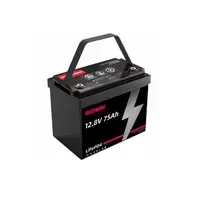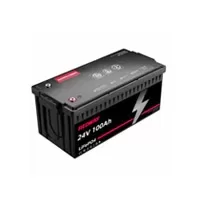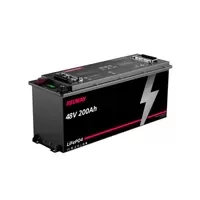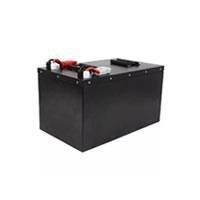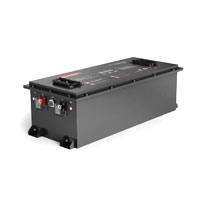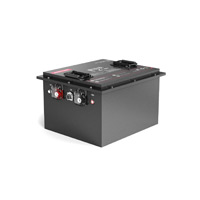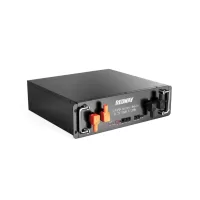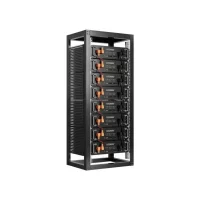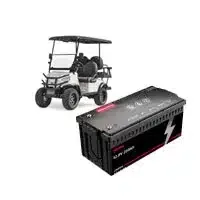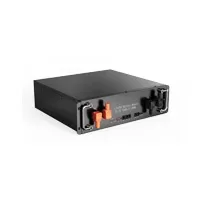Tired of worrying about your phone battery? The rise of LiFePO4 batteries promises a solution. In this post, we’ll explore if these batteries live up to the hype as a revolutionary solid-state technology, so let’s dive into the world of LiFePO4 and see if it’s truly a game-changer!
Properties of LiFePO4 batteries
LiFePO4 batteries, or lithium iron phosphate batteries, offer compelling features for various applications. Let’s explore their standout properties:
- High Energy Density: LiFePO4 batteries can store a significant amount of power in a compact size, making them ideal for portable devices and electric vehicles with limited space.
- Impressive Cycle Life: These batteries exhibit a remarkable cycle life, enduring numerous charge and discharge cycles without significant degradation. This longevity reduces maintenance costs over time.
- Excellent Thermal Stability: LiFePO4 batteries have superior thermal stability, minimizing the risk of overheating or thermal runaway events. This makes them safer in demanding environments or high operating temperatures.
- Low Self-Discharge Rate: With a low self-discharge rate, LiFePO4 batteries retain their charge even during extended periods of non-use, providing longer shelf life and reducing the need for frequent recharging.
- Environmentally Friendly Composition: LiFePO4 batteries are considered environmentally friendly as they lack toxic materials like cobalt. Their composition, featuring non-toxic elements such as iron and phosphate, poses fewer risks during manufacturing and disposal.
In conclusion: LiFePO4 batteries stand out with their unique properties, offering safe, efficient energy storage solutions with long-lasting performance across various industries.
Advantages and disadvantages
LiFePO4 batteries, or lithium iron phosphate batteries, come with distinct advantages and disadvantages. Let’s explore them:
- Advantages:
- High Thermal Stability: LiFePO4 batteries are safer compared to traditional lithium-ion batteries, making them ideal for safety-critical applications like electric vehicles and energy storage systems.
- Long Cycle Life: These batteries can endure thousands of charge-discharge cycles without significant performance degradation, ensuring a longer lifespan.
- Higher Power Density: LiFePO4 batteries offer a higher power density, delivering a large amount of power quickly, suitable for applications requiring high-energy bursts or rapid charging.
- Disadvantages:
- Lower Energy Density: LiFePO4 batteries have lower energy density compared to some lithium-ion alternatives, meaning they may store less energy per unit volume or weight.
- Higher Cost: Despite technological advancements, LiFePO4 batteries are generally more expensive than traditional lithium-ion options like Lithium Cobalt Oxide, limiting their adoption in cost-sensitive applications.
In conclusion, the exceptional safety and long cycle life of LiFePO4 batteries make them attractive, but considerations like energy density and cost may impact their suitability for specific applications. As technology advances and costs decrease, wider adoption of these batteries is expected in the future.
Comparison with traditional lithium-ion batteries
Comparing LiFePO4 batteries to traditional lithium-ion batteries reveals key distinctions. Let’s break down these differences:
- Composition:
- LiFePO4 Batteries: Utilize iron phosphate as the cathode material, enhancing stability and safety.
- Traditional Lithium-ion Batteries: Have a distinct composition without iron phosphate.
- Performance:
- LiFePO4 Batteries: Feature lower energy density, storing less energy in the same volume or weight.
- Traditional Lithium-ion Batteries: Typically offer higher energy density.
- Advantages of LiFePO4 Batteries:
- Longer Cycle Life: LiFePO4 batteries endure more charge-discharge cycles before deterioration.
- Enhanced Thermal Stability: Known for resistance to overheating or thermal runaway.
- Cost:
- LiFePO4 Batteries: Tend to be more expensive due to factors like production volume.
- Traditional Lithium-ion Batteries: Generally more cost-effective with established manufacturing processes.
In conclusion, the choice between LiFePO4 and traditional lithium-ion hinges on specific application needs, considering factors like safety, cycle life, and cost. As LiFePO4 production scales up and technology advances, it’s anticipated that costs will decrease, potentially impacting the landscape of this comparison.
Current use and future potential
LiFePO4 batteries have become a focal point in recent years, finding applications in various industries. Let’s explore their current use and future potential:
- Current Use:
- Electric Vehicles (EVs): LiFePO4 batteries are popular in EVs due to their high energy density, extended lifespan, and enhanced safety, reducing the risk of fires.
- Renewable Energy Storage: Utilized in storage systems for excess electricity generated by solar panels or wind turbines, contributing to grid stabilization.
- Portable Electronics: Widely adopted in devices like smartphones and laptops for their stability and reliability.
- Aerospace: Finding applications in aerospace for their lightweight nature and performance benefits.
- Future Potential:
- Improved Charging Speed: Ongoing research aims to enhance LiFePO4 battery charging speed while maintaining safety features.
- Cost-Effectiveness: Advances in manufacturing processes and materials engineering are expected to make LiFePO4 batteries more cost-effective for wider adoption.
- Wearable Devices: Research explores integrating LiFePO4 technology into wearables like smartwatches and medical implants due to stability and longevity.
In conclusion, LiFePO4 batteries are currently making a significant impact across industries, with ongoing research poised to unlock further potential for these batteries in the future.
Challenges facing the adoption of LiFePO4 batteries
While LiFePO4 batteries hold promise for diverse applications, several challenges hinder their widespread adoption:
- Cost Barrier:
- Challenge: LiFePO4 batteries face a hurdle due to their higher cost compared to traditional lithium-ion batteries, primarily attributed to expensive raw materials like iron and phosphate.
- Impact: Affordability is crucial for mass adoption, limiting their competitiveness in the market.
- Energy Density Limitations:
- Challenge: Despite safety and longevity benefits, LiFePO4 batteries have lower energy density than conventional lithium-ion counterparts.
- Impact: This limitation restricts their suitability for high-energy-demand devices such as electric vehicles, affecting their broader application.
- Size and Weight Issues:
- Challenge: The unique composition of LiFePO4 batteries results in bulkier and heavier designs compared to standard lithium-ion cells.
- Impact: Size and weight constraints can impede their integration into devices where space and weight are critical factors.
- Limited Production Capacity:
- Challenge: Technological constraints and manufacturing challenges limit the large-scale production of LiFePO4 batteries.
- Impact: Supply shortages hinder wider market availability, slowing down their adoption across industries.
- Charging Speed Constraints:
- Challenge: LiFePO4 batteries may have slower charging speeds due to lower conductivity characteristics.
- Impact: This limitation could affect their use in applications where fast charging is essential, impacting overall efficiency.
- R&D Investment Requirements:
- Challenge: Addressing LiFePO4 limitations requires substantial research and development investment.
- Impact: Industry players need to commit resources to overcome challenges like energy density increase, cost reduction, and improved performance.
In conclusion, while LiFePO4 technology shows great potential, overcoming these challenges demands concerted efforts and investments in research and development. Addressing these obstacles will pave the way for broader implementation across sectors.
Related Posts
- Zapping the Voltage: A Simple Guide to Multimeter Testing for AAA Battery Voltage
- Will solid-state batteries replace lithium?
- Will Batteries Last Longer in the Freezer? Answers to Your Freezing Battery Myths!
- Will batteries last longer in the freezer?
- Why you shouldn’t charge your phone overnight?
- Why would someone put batteries in the freezer?


